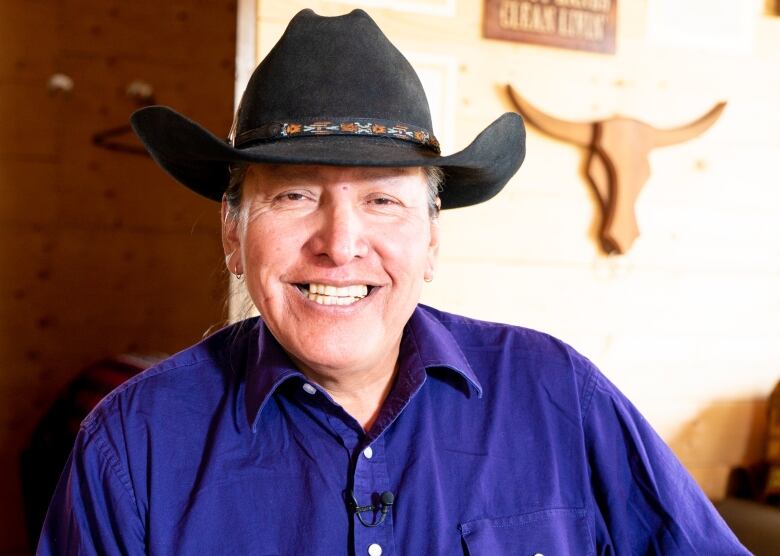Year-round Tipi Camp on Carry the Kettle First Nation offers visitors full experience of living off the land
Equine therapy now part of camp's offerings
The Takoza Tipi Camp may be one of the best kept secrets in the Qu'Appelle Valley.
The camp has been operating in the hills of central Saskatchewan for nearly two decades. It's a year round cultural camp located on the corner of Carry the Kettle First Nation, approximately 100 kilometres east of Regina. It's available to anyone interested in learning about living off the land in a traditional Indigenous-based setting.
"Takoza means grandchildren or grandchild. So traditionally all children that come here, the youth, are all looked at as grandchildren," said Tim Haywahe Sr., one of the founders of the camp.
Haywahe said the camp features traditional teachings like smudging and fire building. It now also offers equine therapy.
"Our programs that we work on [are] intertwined in our teachings and our traditional teachings to our horses." Haywahe said.
"It's not going to just deal with the emotional side. It can deal with their physical side, it's going to deal with the spiritual side too."
Haywahe is from a large family. He had 5 brothers and 5 sisters. All of them, along with their adult children and many grandchildren, grew up around horses and the traditional teachings of the Nakoda people.
It is from these teachings that each individual family member brings their own expertise to the camp: sewing, art, trapping and so on.
The year-round camp is open to anyone who is willing to learn and offers dozens of programs that incorporate modern educational lessons with those of traditional Nakoda teachings.
The camp grew from a family gathering in the late '90s. It soon caught the attention of others and the idea of a camp for the public was born.
He is not just teaching you how to ride a horse. He makes everything a much bigger teaching you about yourself.- Robin Sveinbjornson, Grade 7 teacher, Indian Head Elementary
"We take care of everything there at the camp." Haywahe said. "Anything that is specific to today's education and what [students] are learning we design our programs to fit those."
Land-based learning
The camp is nestled in the hills of the Qu'Appelle valley just off Highway 10, surrounded by trees and countryside. There are several camping areas, a horse corral and large hiking hills.
Once a group or individuals arrive they set up a tipi for their stay. Everyone is expected to bring their own sleeping gear and food, with Haywahe supplying only firewood and water.

Haywahe said that teachings begin as soon as a guest steps foot in the camp.
"In a week we see change when working with groups. We can see a closed off, stand back individual become a more open and outspoken," said Haywahe
"Not only did we walk them through learning with the horses, we did that with the tipi talks, the sweat lodges, the hikes. We are not only teaching them all of this, we are doing it with land-based learning."
Groups like the First Nations University of Canada's education department make yearly visits to the camp.
Last year the camp hosted the Indian Head Elementary Grade 7 class in the middle of winter. Students and teachers made the best of the experience through the -40 C weather.
"[Tim] has kind of like a spiritual connection with the horses and well everything he does has a spiritual traditional meaning to it." said Robin Sveinbjornson, a Grade 7 teacher from Indian Head.
"He is not just teaching you how to ride a horse. He makes everything a much bigger teaching about yourself"
Sveinbjornson said she could see the kids' interest grow as they experienced everything orienteering, shelter building and erecting a tipi while learning the significance of each pole.
"He is a well of knowledge and really works with kids.I had kids of all different strengths and abilities and was always very patient." said Sveinbjornson.
Smudging
Some of Sveinbjornson's Grade 7 students experience certain Indigenous customs for the first time.
"It was really fun! We learned about snaring and we did a smudge. I had never done that before," said Gracie Runns, a Grade 8 student at Indian Head Elementary School.

Runns says that the experience was very memorable and that the activities she was involved in brought the group together and gave her a better understanding of the land.
"Tim is a very good host and he is very good at talking. When we first got there we were all kind of independent and kind of did our own thing and near the end we were all working together."
Haywahe said he enjoys working with people and sharing his own story and teachings.
"I always tell people if they need to re-centre or just need some time to themselves to come out, everyone is welcome."